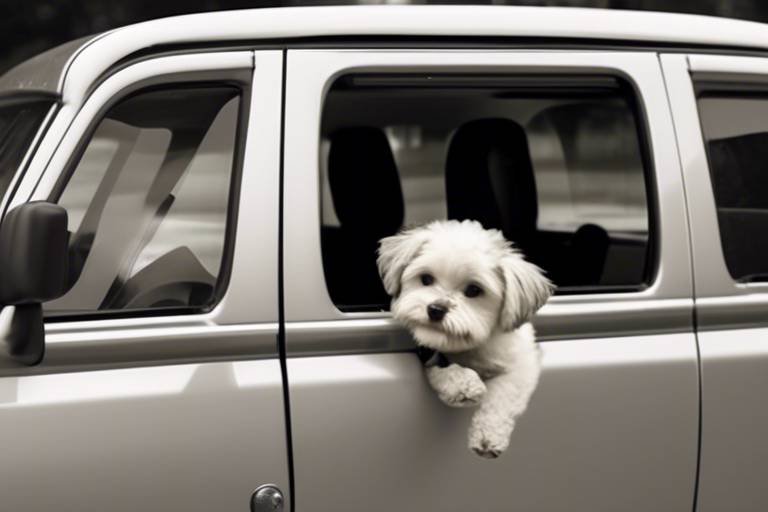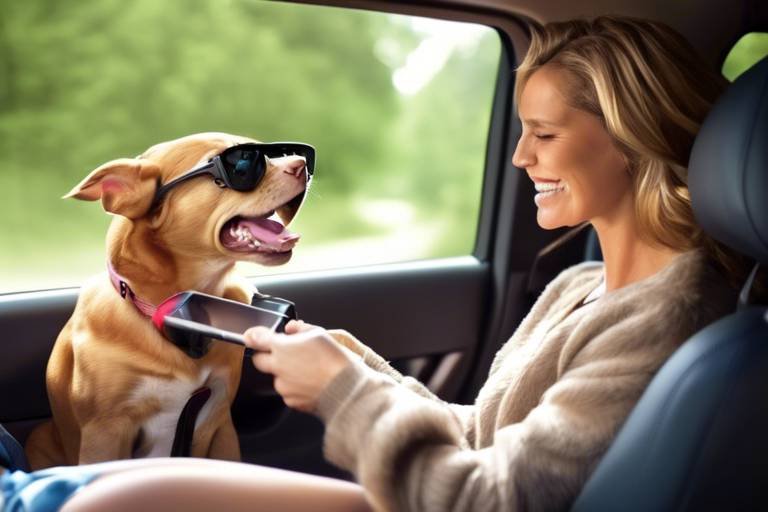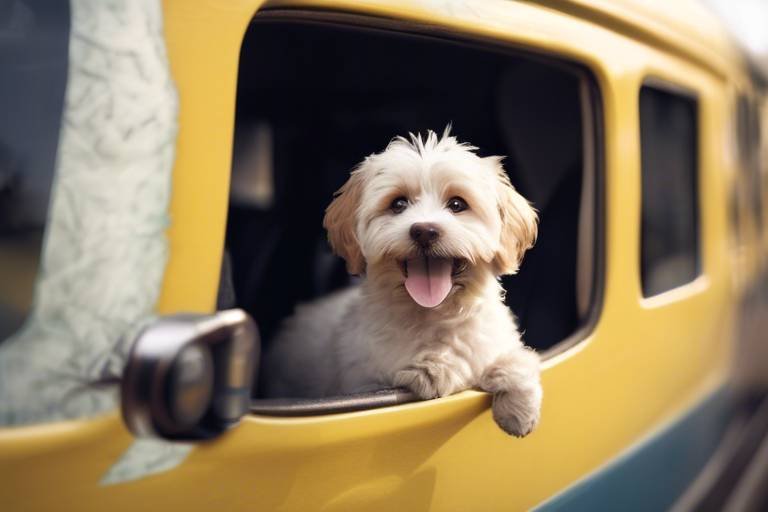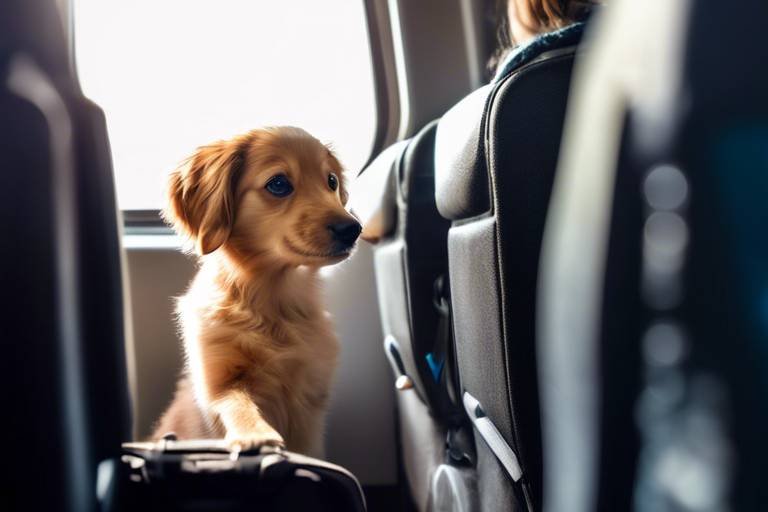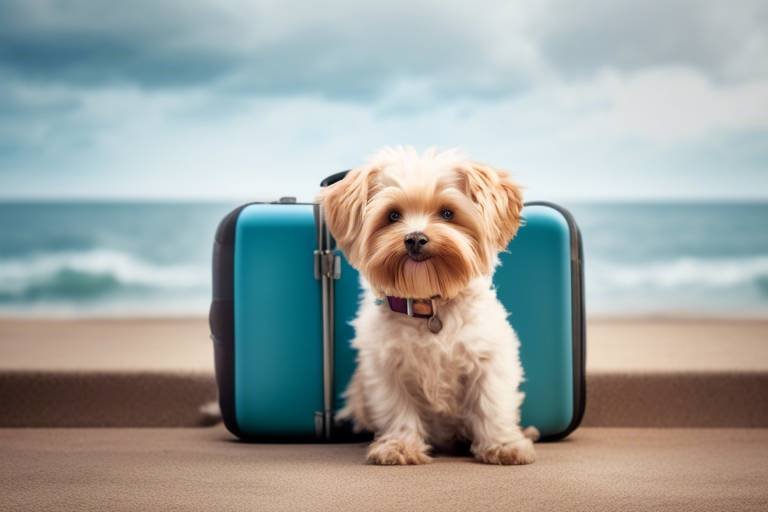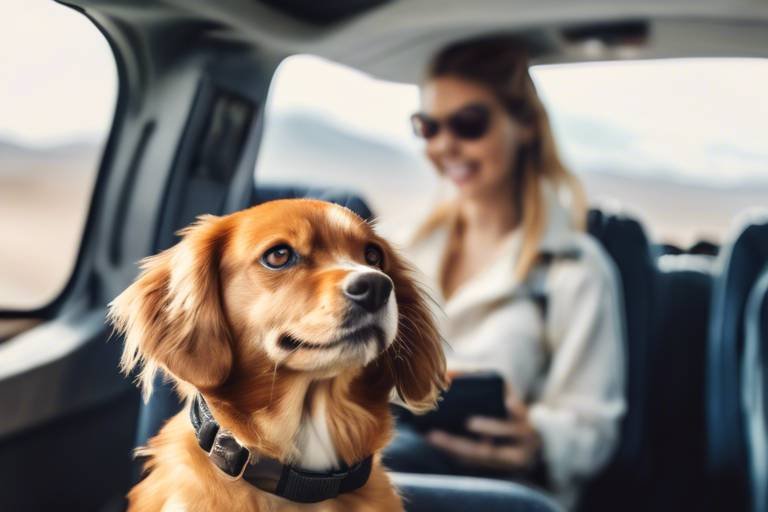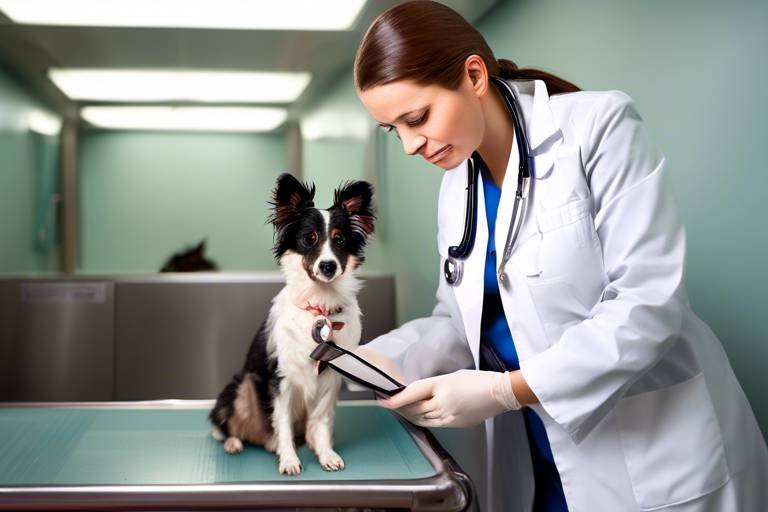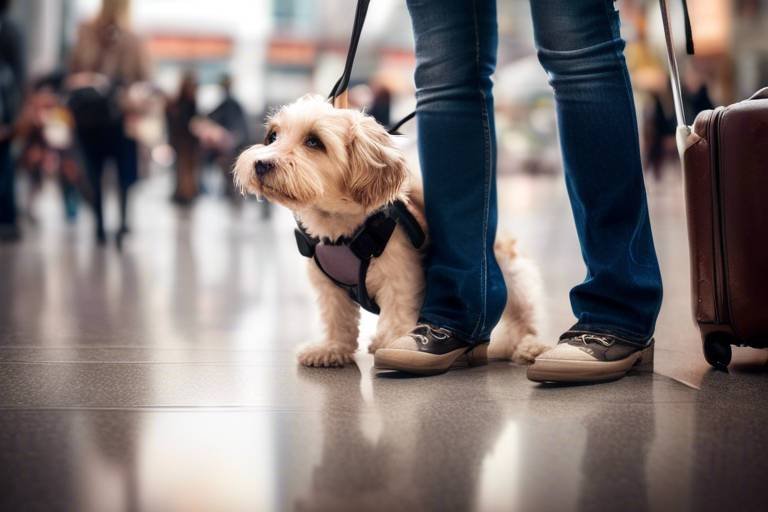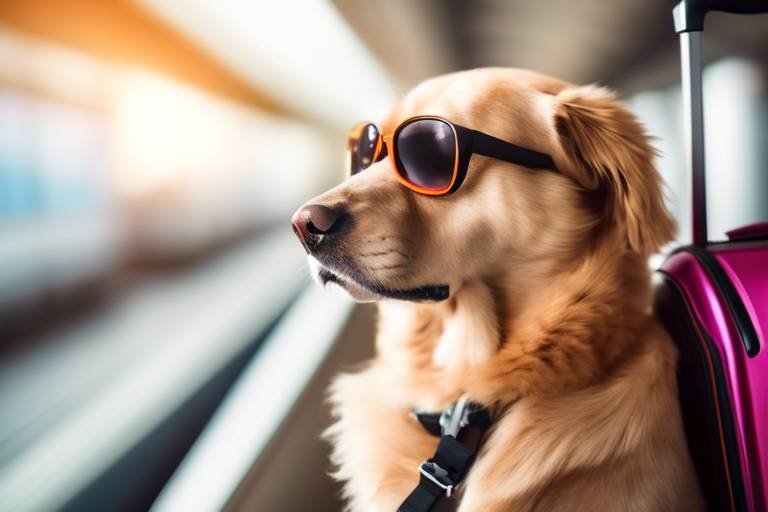The Role of Education in Responsible Pet Travel
Traveling with pets can be one of the most rewarding experiences, but it also comes with its own set of challenges. As a pet owner, education plays a crucial role in ensuring that both you and your furry friend have a safe, enjoyable, and stress-free journey. Just like preparing for a big trip yourself, you need to equip yourself with knowledge about your destination, the rules governing pet travel, and the best practices that will keep your pet comfortable and happy.
Imagine planning a vacation without knowing the local customs or regulations—chaotic, right? The same principle applies to traveling with pets. Understanding the importance of education in this context cannot be overstated. It’s not just about packing your bags; it’s about being prepared for every scenario that could arise during your travels. This preparation can range from knowing the specific pet travel regulations of your destination to understanding the amenities offered by your accommodation.
Education allows you to navigate the often-complex world of pet travel with confidence. For instance, did you know that different countries have varying requirements for pet vaccinations and quarantine procedures? Failing to comply with these regulations can lead to significant delays or even prevent you from entering your chosen destination altogether. By familiarizing yourself with these rules, you can avoid such pitfalls and ensure a smooth travel experience.
Moreover, education helps you make informed decisions about your travel plans. Are you aware of the pet policies of the airlines you plan to fly with? Each airline has its own set of rules regarding pet travel, including size restrictions for carriers and additional fees. Being well-informed allows you to choose the best options for your pet’s needs, ensuring that they travel comfortably and safely.
In addition to understanding regulations and policies, educating yourself about your pet’s specific needs is equally important. Every animal is unique, and what works for one may not work for another. For example, some pets may experience anxiety during travel, while others may be more adaptable. Knowing your pet's temperament can help you prepare adequately, from selecting the right travel gear to planning breaks during long journeys.
In summary, education is the cornerstone of responsible pet travel. It empowers you to make choices that enhance both your and your pet's travel experience. So, as you plan your next adventure, take the time to research and learn about the various aspects of traveling with pets. This investment in knowledge will pay off in spades, making your journey not just possible but also enjoyable.
- What are the essential documents needed for pet travel? - Ensure you have vaccination records, health certificates, and any required permits for your destination.
- How can I help my pet adjust to traveling? - Start with short trips to familiarize your pet with the carrier and gradually increase the duration.
- Are there specific airlines that are more pet-friendly? - Research and compare airlines based on their pet policies, as some are more accommodating than others.
- What should I do if my pet gets sick while traveling? - Locate a nearby vet before your trip, and keep emergency contacts handy.

Understanding Pet Travel Regulations
When it comes to traveling with your furry friend, understanding pet travel regulations is absolutely crucial. Imagine planning a fantastic getaway, only to be met with a mountain of paperwork and unexpected restrictions at the airport! Each country and airline has its own set of rules regarding pet travel, and being in the know can save you from a lot of stress and complications.
First off, it's essential to check the import/export regulations of your destination country. Some places require specific vaccinations, health certificates, or even a quarantine period for pets. For example, countries like Australia and New Zealand have strict regulations to protect their unique ecosystems. Failing to comply could mean your pet is denied entry or, worse, sent back home!
Additionally, airlines often have their own policies regarding pet travel. Some might allow pets in the cabin, while others may require them to be transported in the cargo hold. Here’s a quick overview of what to consider:
| Airline | In-Cabin Policy | Cargo Policy | Fees |
|---|---|---|---|
| Airline A | Yes, up to 15 lbs | Yes | $100 |
| Airline B | No | Yes | $150 |
| Airline C | Yes, up to 20 lbs | Yes | $75 |
Before you book your flight, make sure to read through the airline's pet travel policy thoroughly. You wouldn’t want to be caught off guard at the last minute! It’s also a good idea to call the airline directly to confirm any details or get answers to your specific questions.
Furthermore, don’t forget about the documentation! Most airlines and countries require a health certificate signed by a veterinarian, typically issued within a certain timeframe before travel. This certificate confirms that your pet is healthy and fit to fly. Some countries may also require proof of vaccinations against rabies or other diseases. Keeping these documents organized and easily accessible will make your journey smoother.
To sum it all up, understanding pet travel regulations involves:
- Researching the destination country’s import/export laws.
- Checking the airline’s pet travel policies.
- Obtaining necessary health certificates and vaccination records.
By being well-informed and prepared, you can ensure a much more enjoyable travel experience for both you and your pet. So, before you embark on your next adventure, take the time to understand the regulations that will keep your furry companion safe and sound!

Choosing Pet-Friendly Accommodations
When it comes to traveling with your furry friend, one of the most critical decisions you'll make is choosing the right accommodations. Imagine this: after a long day of travel, you finally arrive at your hotel, only to find out that your beloved pet isn't welcome. The disappointment can be overwhelming, not just for you but for your pet as well. To avoid such a scenario, it's essential to do your homework and select places that cater specifically to pet owners. This way, both you and your pet can enjoy a stress-free and delightful stay.
First and foremost, research is key. There are numerous resources available online that list pet-friendly hotels, motels, and vacation rentals. Websites like BringFido or Airbnb often have filters that allow you to search specifically for accommodations that welcome pets. However, don't just take the listings at face value. Always read the reviews from other pet owners to get a sense of the place’s actual pet-friendliness. Did other guests mention how accommodating the staff was? Were there any hidden fees? These insights can be invaluable in making your decision.
Another crucial aspect to consider is the pet policies of the accommodations. Each place may have different rules regarding the type, size, and number of pets allowed. For example, some hotels may only welcome small dogs, while others might have restrictions on breeds. Additionally, many places charge extra fees for pets, so it’s wise to factor these costs into your travel budget. Before booking, make sure to clarify all the details, including:
- Weight restrictions for pets
- Additional cleaning fees
- Deposit requirements
- Designated pet areas
In addition to understanding the policies, you should also look for pet-friendly amenities. These can significantly enhance your travel experience. For instance, accommodations that provide dog parks, pet beds, or even pet-sitting services can make your stay far more enjoyable. Imagine your pet frolicking in a grassy area while you relax nearby, knowing they are safe and happy. Moreover, some hotels offer special treats or welcome packages for pets, which can make your furry friend feel right at home.
As you plan your stay, don't forget to think about the surrounding area. Are there nearby parks or walking trails where you can take your pet for exercise? Is the accommodation located in a pet-friendly neighborhood? These factors can contribute to a more enjoyable experience for both you and your pet. You might even discover local pet-friendly restaurants or cafes where you can grab a bite to eat together!
Lastly, always have a backup plan. Even the most pet-friendly accommodations can have unforeseen issues, such as overbooking or maintenance problems. It’s a good idea to have a list of alternative places to stay, just in case. This way, you won’t be scrambling at the last minute if something goes awry. Remember, a little preparation goes a long way in ensuring a smooth and enjoyable trip for both you and your beloved pet.
Q: How can I find pet-friendly accommodations?
A: Websites like BringFido and Airbnb allow you to filter results specifically for pet-friendly options. Reading reviews from other pet owners can also provide valuable insights.
Q: Are there usually additional fees for pets?
A: Yes, many accommodations charge extra fees or deposits for pets. Always check the specific policies of the place you are considering.
Q: What should I look for in pet-friendly amenities?
A: Look for features like dog parks, pet beds, and nearby veterinary services to ensure a comfortable stay for your pet.
Q: What if my pet has special needs?
A: Make sure to communicate any special requirements to the accommodation before booking to ensure they can accommodate your pet's needs.
Assessing Pet-Friendly Amenities
When it comes to traveling with your furry friend, assessing pet-friendly amenities can make a world of difference in ensuring a comfortable and enjoyable experience for both you and your pet. Imagine arriving at your destination after a long journey, only to find that your accommodation lacks the basic facilities that cater to your pet's needs. To avoid such a scenario, it’s essential to do your homework before booking a place. Look for accommodations that not only welcome pets but also offer features that can enhance your pet's stay.
One of the first things to consider is whether the place has designated outdoor spaces where your pet can stretch their legs and relieve themselves. Many pet-friendly hotels and rentals provide access to dog parks or even private yards, which can be incredibly beneficial for your pet to unwind after being cooped up during travel. Additionally, check if the property has pet beds or blankets available. A familiar scent can help your pet feel more at home, reducing anxiety and making the transition smoother.
Another aspect to consider is the availability of nearby veterinary services. Knowing that you have access to a vet in case of emergencies can provide peace of mind. Some accommodations even have partnerships with local veterinary clinics, offering discounts for guests. It’s worth asking the property if they can recommend trusted local vets or if they have any arrangements in place for emergencies.
Moreover, understanding the pet policies of the accommodation is crucial. Each place may have different rules regarding the size and breed of pets allowed, as well as additional fees for bringing your pet. Some hotels may charge a non-refundable cleaning fee or a nightly pet fee. By being informed about these policies, you can avoid unexpected costs and ensure that your pet's stay is as hassle-free as possible.
Lastly, consider the location of the accommodation. Is it near pet-friendly parks, walking trails, or beaches? A place that offers easy access to these amenities can significantly enhance your travel experience. After all, what’s the point of traveling with your pet if you can’t enjoy some quality time outdoors together?
In summary, assessing pet-friendly amenities is a crucial step in planning a successful trip with your pet. By focusing on outdoor spaces, pet accommodations, veterinary access, and understanding policies, you can ensure a delightful experience for both you and your furry companion.
- What should I look for in a pet-friendly accommodation? Look for outdoor spaces, pet beds, nearby veterinary services, and clear pet policies.
- Are there usually additional fees for pets? Yes, many accommodations charge a pet fee or cleaning fee. Always check the policies before booking.
- How can I help my pet adjust to a new environment? Bring familiar items such as toys and blankets, and allow your pet to explore the new space at their own pace.
- What if my pet has special needs? Always inform the accommodation in advance about any special requirements your pet may have.
Finding Local Veterinary Services
When embarking on a journey with your furry companion, one of the most crucial steps you can take is to identify local veterinary services at your destination. Imagine this scenario: you're enjoying a beautiful day at a pet-friendly beach, and suddenly your dog starts limping. Panic sets in, and you realize you have no idea where the nearest vet is located. This is why planning ahead is not just a good idea; it's essential for responsible pet travel.
Before you hit the road, take some time to research veterinary clinics and hospitals in the area you'll be visiting. A quick online search can yield valuable information, but don’t stop there! Check social media platforms and local community forums for recommendations and reviews. You might discover hidden gems that aren’t listed on conventional travel websites. This way, you can ensure that you’re choosing a facility that not only has a good reputation but also aligns with your pet's specific needs.
Additionally, consider compiling a list of veterinary services that are open during your travel dates. Some clinics may have limited hours or may be closed on weekends, so knowing their operating hours can save you from unnecessary stress. You might also want to jot down the contact information for these clinics to have it readily accessible in case of an emergency. Here’s a simple table to help you organize this vital information:
| Veterinary Clinic Name | Address | Phone Number | Operating Hours |
|---|---|---|---|
| Paws & Claws Veterinary Clinic | 123 Pet Lane, Dogtown | (555) 123-4567 | Mon-Fri: 9 AM - 5 PM |
| Furry Friends Animal Hospital | 456 Cat Street, Meow City | (555) 987-6543 | Sat-Sun: 10 AM - 4 PM |
Another key consideration is to check if the local veterinary services are equipped to handle emergencies. Some clinics specialize in urgent care, while others may only provide routine services. Knowing this can be a game-changer if your pet requires immediate attention. It’s also beneficial to ask about the clinic's experience with your specific breed, as some pets may have unique health concerns that require specialized care.
Lastly, don’t forget to bring along your pet’s medical records. These documents can provide vital information regarding your pet's health history, vaccinations, and any ongoing treatments. Having these handy not only helps the vet understand your pet’s needs but can also expedite the treatment process in case of an emergency. So, as you prepare for your trip, make sure to check off “find local veterinary services” on your travel checklist. It’s a small step that can lead to a big peace of mind.
- How do I find a good vet while traveling? Research online, check local reviews, and ask for recommendations from fellow pet owners.
- What should I do if my pet has a medical emergency while traveling? Contact the nearest veterinary clinic immediately and follow their instructions.
- Should I bring my pet's medical records when traveling? Yes, having medical records can be crucial for any treatment your pet may need.
Understanding Pet Policies
When it comes to traveling with your furry companions, understanding pet policies at various accommodations is essential. Each place has its own set of rules that can significantly impact your travel experience. For instance, some hotels may only allow pets under a certain weight, while others might have restrictions on the number of pets you can bring. It's crucial to do your homework before booking your stay to avoid any unexpected surprises that could lead to a stressful situation for both you and your pet.
Many accommodations outline their pet policies on their websites, but it’s always a good idea to call ahead and confirm the details. You might find that they have specific requirements, such as:
- Size restrictions: Some places may only accept small breeds, while others are more accommodating.
- Additional fees: Many hotels charge a non-refundable cleaning fee or a daily pet fee that can add up quickly.
- Designated pet areas: Some accommodations have specific areas where pets are allowed, so knowing these can help you plan your stay better.
Moreover, understanding the pet policies of your chosen accommodations can help you avoid any last-minute hiccups. Imagine arriving at a hotel only to find out that your beloved Golden Retriever exceeds their weight limit! Not only would that be disappointing, but it could also lead to additional costs or even the need to find alternative lodging.
Another important aspect to consider is the type of pet-friendly amenities that the accommodation offers. Some places go above and beyond, providing pet beds, bowls, and even treats, while others might not offer anything at all. Knowing what to expect can make a world of difference in ensuring your pet feels at home. Always remember that a well-informed traveler is a happy traveler.
In summary, understanding pet policies is not just about knowing the rules; it's about creating a seamless travel experience for both you and your pet. By doing your research and confirming details ahead of time, you can ensure that your journey is as enjoyable as possible. After all, the ultimate goal is to make memories with your furry friend, not to stress over unforeseen complications!
- What should I do if my pet is not allowed in my chosen accommodation? - Always have a backup plan! Research alternative pet-friendly accommodations in advance.
- Are there any additional fees for bringing my pet? - Yes, many places charge a pet fee or cleaning fee. Always check the policy on their website or call ahead.
- Can I leave my pet alone in the room? - This varies by accommodation. Some places allow it, while others do not. Make sure to check their policy.
- What if my pet has special needs? - It's best to inform the accommodation in advance so they can accommodate your pet's needs appropriately.
Preparing Your Pet for Travel
Traveling with your furry friend can be an exciting adventure, but it also comes with its own set of challenges. Proper preparation is key to ensuring that both you and your pet have a smooth journey. First and foremost, it's essential to familiarize your pet with their travel carrier. Many pets may feel anxious or scared when confined to a new space, so introducing them to the carrier well in advance can help ease their nerves. Start by allowing your pet to explore the carrier at home, making it a cozy and inviting space. You can place their favorite blanket or a few toys inside to create a sense of comfort.
Next, consider taking your pet on short car trips to help them get used to the motion of travel. This gradual exposure can significantly reduce travel anxiety when the time comes for a longer journey. Keep in mind that every pet is different; some may adapt quickly, while others might require more time. It's crucial to be patient and attentive to your pet's needs during this process.
Another vital aspect of preparing for travel is ensuring your pet is in good health. Schedule a visit to the veterinarian for a thorough check-up. This not only ensures that your pet is fit for travel but also gives you the chance to discuss any specific concerns you may have. Don't forget to ask about necessary vaccinations or medications that might be required for your destination. Additionally, having a copy of your pet’s medical records handy can be beneficial, especially if you need to visit a vet while on the road.
Lastly, consider your pet's dietary needs during travel. It's best to stick to their regular feeding schedule as much as possible to avoid any stomach issues. Bring along their usual food, and make sure to pack enough for the duration of your trip, plus a little extra in case of delays. Hydration is equally important, so always carry a portable water bowl and ensure your pet has access to fresh water during the journey.
In summary, preparing your pet for travel involves more than just packing their bags. By familiarizing them with their carrier, taking short trips, ensuring their health, and maintaining their routine, you can create a more enjoyable travel experience for both of you. Remember, a well-prepared pet is a happy pet!
- How can I reduce my pet's anxiety during travel?
Familiarize them with their carrier, take short trips, and maintain their regular routine. - What should I pack for my pet?
Bring their regular food, water, medications, and familiar toys to ease anxiety. - Do I need to visit the vet before traveling?
Yes, a check-up is essential to ensure your pet is healthy and up-to-date on vaccinations. - Can I bring my pet on all airlines?
No, each airline has specific pet policies, so it's important to check in advance.

Packing for Your Pet
Packing for your pet is not just about throwing a few items into a bag; it’s a crucial part of ensuring a smooth and enjoyable travel experience for both you and your furry friend. Just like we wouldn't want to be without our favorite snacks and comforts on a long journey, our pets also need their essentials to feel secure and happy. So, what should you consider when packing for your pet? Let’s dive into the essentials!
First and foremost, it’s essential to bring along your pet's regular food and water. Sudden changes in diet can lead to digestive issues, which are the last thing you want while traveling. Consider packing enough food for the duration of your trip, plus a little extra in case of delays. It’s also wise to bring a portable water bowl to keep your pet hydrated during stops. Remember, hydration is key, especially during long travels!
Next, you’ll want to pack any medications your pet may need. This includes regular medications, as well as any first aid supplies. A small first aid kit can be a lifesaver; think of it as your pet’s travel insurance. Include items like antiseptic wipes, bandages, and any specific medications your pet requires. If your pet has a medical condition, it’s a good idea to have a copy of their medical records handy, just in case you need to visit a vet on the road.
Now, let’s talk about comfort items. Just like we might bring our favorite pillow or blanket, pets also benefit from familiar scents. Packing their favorite blanket or a couple of toys can help ease anxiety and make them feel more at home in unfamiliar environments. Familiar items provide a sense of security, especially during stressful travel situations. If your pet has a favorite chew toy or a plush companion, don’t forget to pack those!
When it comes to travel gear, investing in quality items is essential. A sturdy carrier is a must for safe transport, especially if you’re flying. Make sure it’s well-ventilated and large enough for your pet to stand, turn around, and lie down comfortably. If you're driving, a good harness can help keep your pet secure in the car, preventing any sudden movements that could lead to accidents.
Lastly, let’s not overlook the importance of identification. Before you head out, ensure your pet has a collar with an ID tag that includes your contact information. Microchipping your pet is also a responsible step that can help reunite you if you get separated. In addition, consider bringing a recent photo of your pet, which can be useful if you need to put up lost pet flyers.
In summary, packing for your pet is about thinking ahead and ensuring their comfort and safety. By preparing adequately, you can minimize stress and focus on enjoying your journey together. Remember, a well-prepared pet is a happy pet!
- What should I pack for my pet when traveling? Always pack food, water, medications, comfort items, and quality travel gear.
- How can I help my pet adjust to travel? Familiarize them with their carrier and practice short trips before the big journey.
- Is it necessary to have a first aid kit for my pet? Yes, having a first aid kit can be crucial in case of emergencies while traveling.
- What if my pet gets anxious while traveling? Bring familiar toys and blankets to help comfort them during the journey.
Essential Travel Gear
When it comes to traveling with your furry friend, having the right gear can make all the difference between a smooth journey and a chaotic one. Think of it as packing your pet’s travel toolbox—each item plays a crucial role in ensuring their comfort and safety. First and foremost, investing in a high-quality pet carrier is essential. This is not just a matter of convenience; a sturdy carrier provides your pet with a safe haven during transport, whether you’re navigating busy airports or embarking on a long road trip. Look for carriers that are well-ventilated, spacious enough for your pet to stand and turn around, and easy to secure in your vehicle.
Next up, consider a harness instead of a traditional collar. Why? Well, a harness distributes pressure across your pet’s body, which is especially important during travel when they might be more anxious or excited than usual. A good harness allows for better control and keeps your pet secure, reducing the risk of escape. Plus, many harnesses come with reflective materials for added safety during nighttime walks.
Don’t forget about travel bowls for food and water. Compact, collapsible bowls are perfect for on-the-go feeding and hydration. It's crucial to keep your pet hydrated, especially during long trips. Having familiar items, such as your pet's favorite blanket or a few of their toys, can also help ease anxiety. These items provide a sense of familiarity in new environments, making the journey less stressful for both you and your pet.
Another vital piece of gear is a first aid kit tailored for pets. Just like you would prepare for any unexpected situation, having a pet-specific first aid kit can be a lifesaver. Ensure it includes items like antiseptic wipes, bandages, and any necessary medications. You can either purchase a pre-made kit or assemble your own. Either way, knowing that you’re prepared for minor emergencies can give you peace of mind while traveling.
Lastly, don’t overlook the importance of having a pet ID tag and a microchip. In the unlikely event that your pet gets lost, having up-to-date identification can make a world of difference. Make sure the tag includes your current contact information, and consider a microchip for added security. It’s a small step that can lead to a big reunion.
To sum it up, equipping yourself with the right travel gear is not just about convenience; it’s about ensuring a safe and enjoyable experience for your pet. So, as you prepare for your next adventure, remember that a little preparation goes a long way in making your journey a memorable one.
- What should I look for in a pet carrier? Look for carriers that are well-ventilated, spacious, and easy to secure in your vehicle.
- Is a harness better than a collar for travel? Yes, a harness distributes pressure better and provides more control, making it safer for travel.
- What items should I include in a pet first aid kit? Include antiseptic wipes, bandages, and any necessary medications specific to your pet.
- How can I help my pet feel comfortable during travel? Bring familiar items like toys and blankets to ease anxiety and provide a sense of security.
Health and Safety Considerations
This article explores the importance of education in ensuring safe and enjoyable travel experiences for pets and their owners, highlighting best practices and key considerations for responsible pet travel.
Familiarizing yourself with pet travel regulations is crucial. Different countries and airlines have specific requirements, and knowing these can prevent complications during your journey.
Selecting accommodations that cater to pets is essential for a comfortable stay. Researching pet policies and amenities can enhance your travel experience and ensure your pet's needs are met.
Pet-friendly amenities can greatly improve your pet's travel experience. Look for features such as dog parks, pet beds, and nearby veterinary services to ensure a stress-free stay.
Identifying nearby veterinary services before traveling can provide peace of mind. Knowing where to go in case of emergencies is a key aspect of responsible pet travel.
Each accommodation may have different pet policies. Understanding these rules, including size restrictions and additional fees, will help you choose the right place for your stay.
Proper preparation can ease your pet's travel anxiety. Familiarizing them with carriers and practicing short trips can help them adjust to longer journeys.
Packing the right items for your pet is crucial for their comfort and safety. Essential items include food, water, medications, and familiar toys to ease anxiety during travel.
Investing in quality travel gear, such as carriers and harnesses, can enhance safety and comfort. Selecting the right gear tailored to your pet's needs is vital for a successful trip.
Health and safety should always be a priority when traveling with pets. Regular veterinary check-ups and vaccinations can prevent health issues while on the road. Before embarking on your journey, it’s essential to ensure that your pet is in good health. A visit to the veterinarian can help identify any potential issues that could arise during travel. Additionally, make sure your pet is up to date on all vaccinations, as many places require proof of vaccination for entry.
During travel, keep an eye on your pet's behavior. Signs of stress or discomfort can manifest in various ways, such as excessive barking, panting, or restlessness. If you notice any unusual behavior, it might be a sign that your pet needs a break. Regular stops during long trips can help your pet stretch their legs and relieve themselves, making the journey more enjoyable for both of you.
Another critical aspect of pet health is hydration. Ensure that your pet has access to fresh water at all times, especially during hot weather. Dehydration can lead to serious health issues, so consider investing in a travel water bowl that is easy to use and carry.
Here are a few additional health and safety tips to keep in mind:
- Bring a basic first aid kit tailored for pets, including bandages, antiseptic wipes, and any medications your pet may need.
- Familiarize yourself with the local laws regarding pets in the areas you will be visiting, as some places have specific regulations.
- Microchipping your pet or ensuring they wear a collar with an ID tag can greatly increase the chances of a safe return if they get lost.
By prioritizing health and safety, you can ensure a smoother travel experience for both you and your furry companion, allowing you to focus on the adventure ahead.
Q: What should I do if my pet gets sick while traveling?
A: If your pet shows signs of illness, seek veterinary care immediately. Research local veterinarians before your trip so you know where to go in case of an emergency.
Q: Can I take my pet on an airplane?
A: Yes, but make sure to check the airline's pet policy. Some airlines have specific requirements for pet carriers and health documentation.
Q: How can I help my pet adjust to travel?
A: Start by taking your pet on short car rides to help them get used to being in a carrier or car. Gradually increase the duration of the trips to build their comfort level.
Q: What are some signs that my pet is stressed during travel?
A: Signs of stress in pets can include excessive barking, panting, drooling, or attempting to escape their carrier. If you notice these signs, take a break to let your pet relax.
Frequently Asked Questions
- What are the key regulations I should know before traveling with my pet?
Before you hit the road with your furry friend, it's crucial to familiarize yourself with the specific pet travel regulations of your destination. Different countries and airlines have their own requirements, such as vaccination records, microchipping, and health certificates. Ignoring these can lead to complications or even being denied entry!
- How do I find pet-friendly accommodations?
Finding a place that welcomes pets can be a breeze if you do a little homework. Use websites and apps dedicated to pet-friendly travel, and always check the accommodation's pet policies. Look for amenities like dog parks, pet beds, and other features that ensure your pet feels at home during your stay.
- What should I pack for my pet when traveling?
Packing the right items is essential for your pet's comfort and safety. Make sure to include food, water, medications, and familiar toys to ease their anxiety. Don't forget items like a leash, waste bags, and a first-aid kit. The more prepared you are, the smoother your trip will be!
- How can I prepare my pet for travel?
Preparation is key! Start by getting your pet used to their travel carrier. Take them on short trips to help them acclimate to longer journeys. Also, ensure they are comfortable with travel gear like harnesses or crates. A little practice goes a long way in reducing anxiety on the big day!
- What health and safety considerations should I keep in mind?
Your pet's health and safety should always come first. Schedule a veterinary check-up before traveling to ensure they are healthy and up-to-date on vaccinations. Also, research local veterinary services at your destination so you know where to go in case of an emergency.
- Are there any specific pet policies I should be aware of at accommodations?
Absolutely! Each place may have different pet policies, including size restrictions, breed restrictions, and additional fees. Make sure to read the fine print and communicate with the accommodation beforehand to avoid any surprises upon arrival.
- What essential travel gear should I invest in for my pet?
Quality travel gear can make all the difference! Invest in a sturdy carrier, comfortable harness, and perhaps a travel bed. Tailor your gear to your pet's specific needs, whether they're a small dog or a large cat. The right equipment enhances both safety and comfort during your travels.

